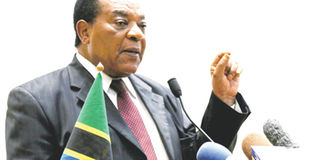Dar opposes AU force in Burundi

Minister of Foreign Affairs, Dr Augustine Mahiga speaks to journalist in Dar es Salaam yesterday after talks with members of diplomatic corps. PHOTO|CITIZEN PHOTOGRAPHER
What you need to know:
President John Magufuli has tasked his minister for Foreign Affairs, East African, Regional and International cooperation, Dr Augustine Mahiga, to urgently search for a common stand on Burundi.
Dar es Salaam. Tanzania embarks on shuttle diplomacy today to re-start stalled Burundi peace talks in an effort to avoid deployment of an African Union (AU) force to the East African country torn by civil strife.
President John Magufuli has tasked his minister for Foreign Affairs, East African, Regional and International cooperation, Dr Augustine Mahiga, to urgently search for a common stand on Burundi.
President Magufuli has separately held talks in Dar es Salaam with representatives of Burundi and other parties involved as heightened negotiations got underway to save the tiny country from slipping into a fully blown out civil war.
Tanzania is of the view that the planned deployment of the African Prevention and Protection Mission (MAPROBU) would escalate the crisis and lead to more human casualties, instead favouring a negotiated political settlement among warring parties.
Dr Mahiga will today leave for Uganda where he is expected to hold talks with President Yoweri Museveni who was leading the stalled Burundi peace talks before pulling back over disagreements with the protaginists.
From Kampala, Dr Mahiga will fly to Bujumbura on Thursday for a meeting with embattled president Pierre Nkurunziza, members of the opposition parties and civil society.
The minister will also access the security situation in Burundi where more than 400 people have recently been killed in clashed between government troops and civilians opposed to President Nkurunziza’s presidency, whose controversial third term in office sparked the crisis early in the year.
Yesterday in Dr Mahiga held closed door talks with members of the diplomatic corps in Dar es Salaam where the Burundi issue was discussed.
The minister told reporters later that Tanzania hopes to have the Kampala peace talks back on track on December 28. The country will then host ministers for foreign affairs of the East African Countries in Arusha on January 8 ahead of the Heads of State Summit as part of the process to seek for a lasting solution to the Burundi equation. Tanzania is currently the chair of the EAC summit.
“Tanzania has three tasks on Burundi: One is to ensure we facilitate the Kampala talks, secondly assess the situation on the ground and thirdly is to talk to AU to consider giving room to negotiations,” Dr Mahiga said.
He said President Magufuli was keen to resumption of the peace talks since he came into power. The President has already communicated with his EAC counterparts, he said. According to Dr Mahiga, Tanzania’s involvement had been delayed due to the government transition after the October General Election.
In opposing the AU vote for deployment of a peace force to Burundi, Dr Mahiga noted that Tanzania still believed a political solution remained the best way out.
The minister said he hoped to convince AU Chairperson Ms Nkosazana Dlamini-Zuma to re-consider its stance and give chance for talks.
“We have all the reasons to involve ourselves with the situation in Burundi because they are our neighbours and their insecurity affects us too,” he said. There are currently more than 120,000 Burundi refugees in Tanzania.
The AU’s Peace and Security Council agreed last Friday to deploy the peace force for an initial period of six months. The resolution would see the first ever deployment of such a force in a member country.
The continental body gave the Burundi government 96 hours to cooperate fully and accept the deployment of peacekeepers, warning that it reserved the right to enforce its decision to send in forces - as per its charter.
But the Burundi government has rejected the AU decision, warning it would retaliate should any foreign army invade its soil.
The peacekeeping mission is primarily to protect civilians.
The surge in violence in Burundi has raised fears of a return to civil war, a decade after the end of a 1993-2006 conflict between rebels from the Hutu majority and an army dominated by minority Tutsis, which left 300,000 people dead.
Dr Mahiga reminded yesterday how Tanzania shouldered the burden to return Burundi on its feet following the Arusha Accord.
“Our relationship with Burundi dates back in history, we share a common boarder and many other issues,” he said.
The minister who is a seasoned diplomat said the negative impact of the deteriorating political situation in Burundi will spill over to neighboring countries if left out unchecked. He however said the western media had misrepresented the crisis in Burundi as genocide.
Earlier yesterday, the president of the senate council of Burundi, Mr Reverien Ndikuriyo, held talks with President Magufuli. He also held another meeting with the Deputy Speaker, Dr Tulia Ackson. He was in the country to seek Tanzania’s intervention in the Burundi crisis.




